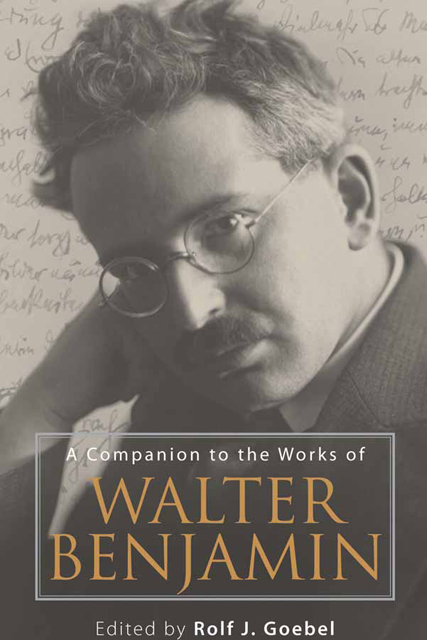Book contents
- Frontmatter
- Contents
- Preface
- Sources of Benjamin’s Works
- Chronology of Benjamin’s Major Works
- Introduction: Benjamin’s Actuality
- 1 Walter Benjamin's Criticism of Language and Literature
- 2 The Presence of the Baroque: Benjamin’s Ursprung des deutschen Trauerspiels in Contemporary Contexts
- 3 Lost Orders of the Day: Benjamin's Einbahnstraße
- 4 Literature as the Medium of Collective Memory: Reading Benjamin’s Einbahnstraße, “Der Erzähler,” and “Das Paris des Second Empire bei Baudelaire”
- 5 Benjamin in the Age of New Media
- 6 One Little Rule: On Benjamin, Autobiography, and Never Using the Word “I”
- 7 The Passagen-Werk Revisited: The Dialectics of Fragmentation and Reconfiguration in Urban Modernity
- 8 Benjamin’s Politics of Remembrance: A Reading of “Über den Begriff der Geschichte”
- 9 The Legacy of Benjamin’s Messianism: Giorgio Agamben and Other Contenders
- 10 Paris on the Amazon? Postcolonial Interrogations of Benjamin’s European Modernism
- 11 Benjamin’s Gender, Sex, and Eros
- 12 Sonic Dreamworlds: Benjamin, Adorno, and the Phantasmagoria of the Opera House
- Select Bibliography and List of Further Reading
- Notes on the Contributors
- Index
1 - Walter Benjamin's Criticism of Language and Literature
Published online by Cambridge University Press: 28 February 2023
- Frontmatter
- Contents
- Preface
- Sources of Benjamin’s Works
- Chronology of Benjamin’s Major Works
- Introduction: Benjamin’s Actuality
- 1 Walter Benjamin's Criticism of Language and Literature
- 2 The Presence of the Baroque: Benjamin’s Ursprung des deutschen Trauerspiels in Contemporary Contexts
- 3 Lost Orders of the Day: Benjamin's Einbahnstraße
- 4 Literature as the Medium of Collective Memory: Reading Benjamin’s Einbahnstraße, “Der Erzähler,” and “Das Paris des Second Empire bei Baudelaire”
- 5 Benjamin in the Age of New Media
- 6 One Little Rule: On Benjamin, Autobiography, and Never Using the Word “I”
- 7 The Passagen-Werk Revisited: The Dialectics of Fragmentation and Reconfiguration in Urban Modernity
- 8 Benjamin’s Politics of Remembrance: A Reading of “Über den Begriff der Geschichte”
- 9 The Legacy of Benjamin’s Messianism: Giorgio Agamben and Other Contenders
- 10 Paris on the Amazon? Postcolonial Interrogations of Benjamin’s European Modernism
- 11 Benjamin’s Gender, Sex, and Eros
- 12 Sonic Dreamworlds: Benjamin, Adorno, and the Phantasmagoria of the Opera House
- Select Bibliography and List of Further Reading
- Notes on the Contributors
- Index
Summary
Benjamin's Language Criticism: Introduction
IN WALTER BENJAMIN's INTELLECTUAL PHYSIOGNOMY, criticism plays a leading role: one finds the term in many of his writings, and many of the books and articles about him bear the words “critique” or “critic” in their titles. He established himself as a leading critic of language as well as of literature and art during the Weimar Republic until his suicide in 1940. Every text by Walter Benjamin is a text on language, expressed in a certain way in language. In “Notiz über ein Gespräch mit Béla Ballasz” (“Notes on a Conversation with Béla Balász”) he refers to a characterization of his own style by the Austrian journalist Alfred Polgar, in which Polgar proposed that he, Benjamin, uses even German words as if they were foreign (GS VI:418; SW 2.1:276–77). That makes Benjamin a kind of deconstructionist avant la lettre, who anticipated the later theories of Jacques Derrida, Paul de Man, and others, although in a different context.
One may divide his explicit expressions about language into an official and published part and an unofficial one that was only meant for a dialogue with himself and some close friends. Benjamin's writings about language published in his lifetime include the introduction to Ursprung des deutschen Trauerspiels (Origin of the German Mourning Play; written 1924, published 1928; GS I:203–430); here one finds relicts of a Habilitation project, planned in 1920/21 but not realized, on the language theory of the Scholastic John Duns Scotus — a subject about which Martin Heidegger wrote his own Habilitation thesis in 1916. The second important essay is another introduction, this one to his translation of Charles Baudelaire's cycle of poems Tableaux parisiens, bearing the title “Die Aufgabe des Übersetzers” (GS IV.1:9–21; “The Task of the Translator,” SW 1:253–63); published in 1923, it is today a classic among the theories of translation. Even though he wrote it in language close to that of Stefan George, it still has relevance for today's globalized world, as we will see below. A third essay was published 1934 in the Zeitschrift für Sozialforschung: “Probleme der Sprachsoziologie. Ein Sammelreferat” (GS III, 452–80; “Problems in the Sociology of Language,” SW 3, 68–93). In this text Benjamin discusses his own ideas in a wider context; his interest is spurred by a mimetic and onomatopoetic function, which he tries to detach from its “primitive” context and actualize in the contemporary state of language.
- Type
- Chapter
- Information
- A Companion to the Works of Walter Benjamin , pp. 23 - 45Publisher: Boydell & BrewerPrint publication year: 2009



